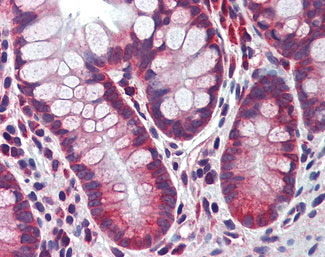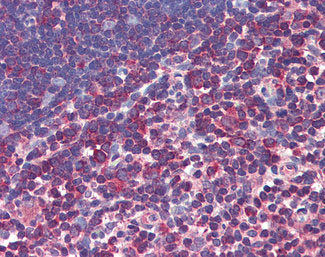CASP8 / Caspase 8 Antibody
Rabbit Polyclonal Antibody
- SPECIFICATION
- CITATIONS
- PROTOCOLS
- BACKGROUND

Application
| WB, IHC-P |
|---|---|
| Primary Accession | Q14790 |
| Reactivity | Human, Mouse |
| Host | Rabbit |
| Clonality | Polyclonal |
| Calculated MW | 55kDa |
| Dilution | IHC-P (5 µg/ml), WB (0.5 µg/ml), |
| Gene ID | 841 |
|---|---|
| Other Names | Caspase-8, CASP-8, 3.4.22.61, Apoptotic cysteine protease, Apoptotic protease Mch-5, CAP4, FADD-homologous ICE/ced-3-like protease, FADD-like ICE, FLICE, ICE-like apoptotic protease 5, MORT1-associated ced-3 homolog, MACH, Caspase-8 subunit p18, Caspase-8 subunit p10, CASP8, MCH5 |
| Target/Specificity | 15 amino acid peptide from near the middle of human caspase-8 isoform E |
| Reconstitution & Storage | Short term 4°C, long term aliquot and store at -20°C, avoid freeze thaw cycles. Store undiluted. |
| Precautions | CASP8 / Caspase 8 Antibody is for research use only and not for use in diagnostic or therapeutic procedures. |
| Name | CASP8 {ECO:0000303|PubMed:9931493, ECO:0000312|HGNC:HGNC:1509} |
|---|---|
| Function | Thiol protease that plays a key role in programmed cell death by acting as a molecular switch for apoptosis, necroptosis and pyroptosis, and is required to prevent tissue damage during embryonic development and adulthood (PubMed:23516580, PubMed:8681376, PubMed:8681377, PubMed:9006941, PubMed:9184224, PubMed:8962078, PubMed:35446120, PubMed:35338844). Initiator protease that induces extrinsic apoptosis by mediating cleavage and activation of effector caspases responsible for FAS/CD95-mediated and TNFRSF1A-induced cell death (PubMed:23516580, PubMed:8681376, PubMed:8681377, PubMed:9006941, PubMed:9184224, PubMed:8962078, PubMed:35446120, PubMed:35338844). Cleaves and activates effector caspases CASP3, CASP4, CASP6, CASP7, CASP9 and CASP10 (PubMed:8962078, PubMed:9006941, PubMed:16916640). Binding to the adapter molecule FADD recruits it to either receptor FAS/TNFRSF6 or TNFRSF1A (PubMed:8681376, PubMed:8681377). The resulting aggregate called the death-inducing signaling complex (DISC) performs CASP8 proteolytic activation (PubMed:9184224). The active dimeric enzyme is then liberated from the DISC and free to activate downstream apoptotic proteases (PubMed:9184224). Proteolytic fragments of the N- terminal propeptide (termed CAP3, CAP5 and CAP6) are likely retained in the DISC (PubMed:9184224). In addition to extrinsic apoptosis, also acts as a negative regulator of necroptosis: acts by cleaving RIPK1 at 'Asp-324', which is crucial to inhibit RIPK1 kinase activity, limiting TNF-induced apoptosis, necroptosis and inflammatory response (PubMed:31827280, PubMed:31827281). Also able to initiate pyroptosis by mediating cleavage and activation of gasdermin-C and -D (GSDMC and GSDMD, respectively): gasdermin cleavage promotes release of the N- terminal moiety that binds to membranes and forms pores, triggering pyroptosis (PubMed:32929201, PubMed:34012073). Initiates pyroptosis following inactivation of MAP3K7/TAK1 (By similarity). Also acts as a regulator of innate immunity by mediating cleavage and inactivation of N4BP1 downstream of TLR3 or TLR4, thereby promoting cytokine production (By similarity). May participate in the Granzyme B (GZMB) cell death pathways (PubMed:8755496). Cleaves PARP1 and PARP2 (PubMed:8681376). Independent of its protease activity, promotes cell migration following phosphorylation at Tyr-380 (PubMed:18216014, PubMed:27109099). |
| Cellular Location | Cytoplasm {ECO:0000250|UniProtKB:Q9JHX4}. Nucleus {ECO:0000250|UniProtKB:Q9JHX4}. Cell projection, lamellipodium. Note=Recruitment to lamellipodia of migrating cells is enhanced by phosphorylation at Tyr-380 |
| Tissue Location | Isoform 1, isoform 5 and isoform 7 are expressed in a wide variety of tissues. Highest expression in peripheral blood leukocytes, spleen, thymus and liver. Barely detectable in brain, testis and skeletal muscle |

Thousands of laboratories across the world have published research that depended on the performance of antibodies from Abcepta to advance their research. Check out links to articles that cite our products in major peer-reviewed journals, organized by research category.
info@abcepta.com, and receive a free "I Love Antibodies" mug.
Provided below are standard protocols that you may find useful for product applications.
Background
Most upstream protease of the activation cascade of caspases responsible for the TNFRSF6/FAS mediated and TNFRSF1A induced cell death. Binding to the adapter molecule FADD recruits it to either receptor. The resulting aggregate called death- inducing signaling complex (DISC) performs CASP8 proteolytic activation. The active dimeric enzyme is then liberated from the DISC and free to activate downstream apoptotic proteases. Proteolytic fragments of the N-terminal propeptide (termed CAP3, CAP5 and CAP6) are likely retained in the DISC. Cleaves and activates CASP3, CASP4, CASP6, CASP7, CASP9 and CASP10. May participate in the GZMB apoptotic pathways. Cleaves ADPRT. Hydrolyzes the small-molecule substrate, Ac-Asp-Glu-Val-Asp-|-AMC. Likely target for the cowpox virus CRMA death inhibitory protein. Isoform 5, isoform 6, isoform 7 and isoform 8 lack the catalytic site and may interfere with the pro-apoptotic activity of the complex.
References
Boldin M.P.,et al.Cell 85:803-815(1996).
Muzio M.,et al.Cell 85:817-827(1996).
Fernandes-Alnemri T.,et al.Proc. Natl. Acad. Sci. U.S.A. 93:7464-7469(1996).
Srinivasula S.M.,et al.J. Biol. Chem. 272:18542-18545(1997).
Grenet J.,et al.Gene 226:225-232(1999).
If you have used an Abcepta product and would like to share how it has performed, please click on the "Submit Review" button and provide the requested information. Our staff will examine and post your review and contact you if needed.
If you have any additional inquiries please email technical services at tech@abcepta.com.













 Foundational characteristics of cancer include proliferation, angiogenesis, migration, evasion of apoptosis, and cellular immortality. Find key markers for these cellular processes and antibodies to detect them.
Foundational characteristics of cancer include proliferation, angiogenesis, migration, evasion of apoptosis, and cellular immortality. Find key markers for these cellular processes and antibodies to detect them. The SUMOplot™ Analysis Program predicts and scores sumoylation sites in your protein. SUMOylation is a post-translational modification involved in various cellular processes, such as nuclear-cytosolic transport, transcriptional regulation, apoptosis, protein stability, response to stress, and progression through the cell cycle.
The SUMOplot™ Analysis Program predicts and scores sumoylation sites in your protein. SUMOylation is a post-translational modification involved in various cellular processes, such as nuclear-cytosolic transport, transcriptional regulation, apoptosis, protein stability, response to stress, and progression through the cell cycle. The Autophagy Receptor Motif Plotter predicts and scores autophagy receptor binding sites in your protein. Identifying proteins connected to this pathway is critical to understanding the role of autophagy in physiological as well as pathological processes such as development, differentiation, neurodegenerative diseases, stress, infection, and cancer.
The Autophagy Receptor Motif Plotter predicts and scores autophagy receptor binding sites in your protein. Identifying proteins connected to this pathway is critical to understanding the role of autophagy in physiological as well as pathological processes such as development, differentiation, neurodegenerative diseases, stress, infection, and cancer.



